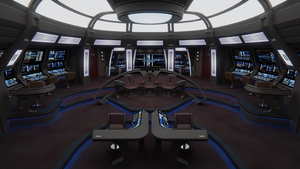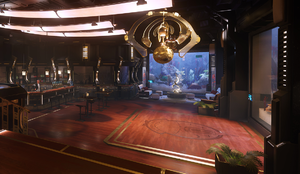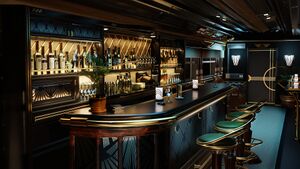USS Endeavour
The USS Endeavour (NCC-91502) is an Obena-class starship assigned to the Fourth Fleet under the command of Captain Matt Rourke. Commissioned in late-2399, Endeavour was attached to a diplomatic mission to the Neutral Zone to continue the work of her namesake, a Manticore-class decommissioned after a terrorist attack by the Romulan Rebirth Movement. In the face of these regional difficulties, Starfleet has recommitted to building bridges with the Romulan factions and bringing stability and support to a troubled region that has become a home to warlords and refugees alike.
While her duties take her wherever Starfleet needs, Endeavour's primary mission thus is one of diplomacy and security in volatile regions, where the Federation's offer of support, stability, and relationship-building can do the most good. Since her commissioning, Endeavour has performed key duties in some of the most notable incidents of the dawn of the 25th century, from responses to the Century Storm to the stabilisation of the Velorum Sector during the fall of the Romulan Star Empire.
Design and Layout
Expected to take point on diplomatic operations in a fraught region of space, Endeavour has been outfitted to defend herself, but more importantly has the facilities to represent the Federation by hosting summits and providing humanitarian relief. Permanent offices have been set aside for the Diplomatic Service staff adjacent to the VIP section and conference rooms, space reserved for a bullpen of their desks and an office for the Mission Leader. Likewise, Endeavour offers relaxation space to support not just the crew, civilian staff, and families who live aboard, but also accommodate guests.
Large sections of the ship are thus designed with comfort in mind, rather than the strict efficiency of many modern Starfleet vessels. Most decks offer at least an observation lounge for relaxation and socialising, and the ship has multiple mess halls of varying size. The aesthetic of such leisure spaces varies heavily depending on their location; those near civilian, VIP, guest, or diplomatic quarters are conscious of the needs of non-Starfleet residents and visitors, while the mess hall near Main Engineering, for example, is one of the more stark, rough, and ready break spaces aboard.
The Security Department section includes facilities for Endeavour's Hazard Team. This consists of a small training area, a locker room, armoury, and briefing room. It allows the team to operate independent of the Security Department for selection, training, and mission preparation.
Bridge
The Obena-class's aesthetics intentionally harken back to Starfleet's golden days of exploration, and Endeavour is no different, blending traditions with modern innovation. The bridge is designed to be visually impressive for crew, visitors, and those communicating by viewscreen. As with much of the ship, the colours are rich burgundies and blues on carpets and upholstery, with brushed copper or bronze for fixtures and consoles.Unlike some Obenas, Endeavour's bridge has three central chairs, rather than one command chair. The chair to the CO's right is reserved for the executive officer; the left, while formally a space for guests or mission advisors, has commonly become the bridge seat for diplomatic mission leader First Secretary Sophia Hale. They nestle in a tactical arch derived from bridge designs for the Galaxy Class, which helps create and demark space, and all stations have comfortable seating.At the rear of the bridge is a dedicated mission control section. A step down from the main deck, its four stations allow a bridge officer to supervise multiple assets in the field beyond a ship's own operations. These are most commonly used to oversee the activities of deployed auxiliary ships if flight control's focus is on piloting Endeavour and away team operations, particularly those of the Hazard Team.
Strategic Operations Centre
At Captain Rourke's behest, facilities akin to the Combat Information Centre aboard Endeavour's predecessor were installed aboard. Designated as the Strategic Operations Centre, the SOC can harness the greater space and resources of an Obena to provide an information and analysis hub supporting mission objectives beyond merely military, and including economic and political. From the SOC, staff have an overview of a region on the holographic interface and can monitor changes and plan operations. This positions Endeavour for data gathering and analysis operations across multiple systems and locations, be they focused on strategy, intelligence, or science.
With the multi-mission nature of the ship, the SOC sees extensive use as a mission planning centre during diplomatic operations with multiple local concerns, such as security or humanitarian support. With Endeavour's regular long-term operations in a single area, the SOC facilitates the Chief Intelligence Officer's work to maintain records and build up actionable knowledge to support missions. It also often sees use by the civilian and Starfleet diplomatic staff when liaising.
The Safe House
There are several messes and lounges aboard Endeavour, offering space for the crew to socialise, relax, eat and drink. Most are built in the same standard design as the rest of the ship. An exception is the Safe House. The main lounge and bar aboard Endeavour, it acts not just as a leisure space for the crew, but hosts gatherings with guests that could include diplomats and dignitaries. As such, it has been designed for comfort and entertainment, with floor panels of real maple and brass-coloured fixtures to give the establishment a warm, welcoming feel helped by gentle lighting. Seating is a mixture of comfortable booths that can provide a limited privacy or even intimacy, and tables on the main floor that are cleared away when more space is needed.
Staff are mostly holograms overseen by several living shift leaders and the manager, and all have attire matching the art deco style to invoke something of the feel of a 1920s speakeasy. This aesthetic is supported by the music from a holographic band on the main stage, though the space is sometimes used for live performances by crewmembers. The Safe House can swing between an atmosphere of a bustling party to a more intimate buzz, but the nature of the Starfleet life and its shift patterns means it always feels like a place to catch up over bar snacks and a drink, or at least a coffee.
The Round Table
The officers' mess on Deck 7 has been named the Round Table. Reserved for the exclusive use of the senior staff and officers of the rank of lieutenant and above, it has been designed for a close, intimate feel for small gatherings or one-on-one meetings. It is furnished in blacks, golds, and greens in an art deco style not dissimilar to the Safe House, but less bold and more cosy. Seating is at the bar or one of the narrow booths, and refreshments are provided by the bar staff. This includes replicated fare, but several of Endeavour's officers have stocked the bar with drinks from their personal supplies with varying levels of generosity. It is a preferred place for officers seeking a quiet drink, a private conversation, or a getaway from the hustle and bustle of the ship. On occasion, it is reserved by the captain for gatherings exclusively for the senior staff or his guests.
The Earl of Pembroke
Referred to often as just 'the Pembroke', this was originally a standard secondary mess hall on Deck 5. Since Endeavour altered its mission profile to bring civilian families aboard, Captain Rourke had the mess hall refitted to better suit their needs. Laid out now in the style of a traditional British pub, the Pembroke is a family-friendly venue with table service for food and drinks, where crewmembers can get away from a work environment with their loved ones. It has a back room with a holo-table that offers a variety of games, and this in particular has become a favoured haunt of the smattering of teenagers aboard Endeavour.
Auxiliary Craft
Some of the auxiliary craft from the previous Endeavour were recovered, and Rourke retained and expanded the naming conventions of before, shuttles and runabouts named after the mythical court of Camelot instituted originally by Captain Leonidas MacCallister. Rather than retain the full complement of shuttles for an Obena, a quartet of fighters have been installed, deployed for ceremonial escort duties as much as patrol and scouting missions.
Type-12 Shuttles
Eight of the auxiliary craft aboard are Type-12 shuttles, the standard for most Starfleet ships. With only a flight crew of one or two officers, they struggle to fit even an additional four personnel aboard. Despite this, they are capable of reasonably long-distance missions. With other, larger auxiliary craft aboard, the Type-12s are usually reserved for simple ferrying or survey duties.
- Galahad
- Lancelot
- Bedivere
- Percival
- Gawain
- Tristan
- Agravain
- Dagonet
Orion-class runabouts
The two Orion-class runabouts are the 'mid-weight' auxiliary craft for Endeavour. With a flight crew of only three, they are reserved either for long-range missions for only two to four crew where its bunk space and facilities will be needed, or significant survey or away operations close to home making use of the resources without relying on Endeavour herself.
- Uther Pendragon
- Merlin
New Atlantic-class runabouts
Endeavour's two New Atlantic-class runabouts are the vessels of choice for major away team operations. They see heavy use for missions taking the crew far from the ship, and are particularly favoured for use by the Hazard Team when transporters are inadequate. The different modules make them highly-flexible in their deployments, though both runabouts have the scouting modules installed as default. The King Arthur in particular has a long history with Endeavour's crew, recovered from the ship's predecessor and playing a major role in many missions.
- King Arthur
- Guinevere
Captain's Yacht
The Prydwen is the captain's yacht, reserved exclusively for use by Captain Rourke. A large, warp-capable craft, it is intended primarily for diplomatic duties where it is appropriate for the commanding officer to travel in person and 'fly the flag.' It includes a comfortable state room for the captain, two small bunkrooms for pilots and security personnel, a mess and break room for the crew, and a function room that can serve for diplomatic duties of hosting meetings or dinners.
Despite its primary purpose in diplomacy, because it is likely to host significant dignitaries - and the ship's captain - the Prydwen is well-armed, well-armoured, and notably fast even for a craft of its size.
Valkyrie-class starfighters
Several of the shuttles included in a standard Obena complement were removed to make space for a flight of four Valkyrie-class starfighters. While they are tactical vessels, Captain Rourke brought them aboard to also serve a ceremonial role in diplomatic affairs, and for their high speeds and sophisticated sensor arrays rendering them suitable for initial, simple reconnaissance in potentially fraught regions. The 'Black Knights,' as the flight are called, consist of four permanently-assigned pilots, all of whom also fulfil departmental roles as relief flight control officers or shuttle crew. If the full flight is deployed beyond a single shift, such as in cases of emergencies or in the rare occasions when a Combat Air Patrol needs maintaining, other flight control officers trained to pilot a Valkyrie are seconded.
Because of the ceremonial role of the Valkyries, where they often fly escort for diplomatic craft in a role that sometimes includes providing security, the craft themselves are kept in peak visual condition, while the pilots train regularly for complex formation flying.
History
The USS Endeavour was originally commissioned as the Tianwen, one of the last waves of Obena-class ships constructed in the 24th century. As the United Federation of Planets began to reconsider its isolationist policies after the Coppelius incident of mid-2399, the construction of more ships capable of conducting missions of diplomacy and exploration was ordered. With the Obenas originally designed in the years after the Dominion War to evoke the prestige of Starfleet's more peaceful eras, a new construction order was logical.
The Tianwen had an uneven birth. An error by programmers slowed the development of her bio-neural circuitry, a delay that cost the Tianwen the anticipated choice for commanding officer, as Captain Dorain accepted assignment to Starfleet Science instead. She was considered a choice for First Secretary Sophia Hale's diplomatic expedition to the Neutral Zone, but without a captain or selected crew, the duty remained with Hale's first choice, the Manticore-class USS Endeavour.
When Endeavour was damaged by sabotage at the hands of the Romulan Rebirth Movement and decommissioned, Admiral Alexander Beckett stepped in to secure the Tianwen for the Neutral Zone operation. At his behest she was renamed Endeavour, with the admiral arguing the continuity sent a message to those who opposed Starfleet's involvement in the region. The surviving crew of the previous Endeavour were assigned to the new ship, including commanding officer Captain Rourke, and further personnel selected to bolster her ranks.
In December 2399, Endeavour entered the Romulan Neutral Zone to begin relief missions. Early on this included cooperation with both the Romulan Star Empire and Republic in establishing relations with the more self-sufficient independent worlds, from the mining planet Nerillian to the trading hub Meldesa. For months, the presence of a Starfleet ship and a formal diplomatic mission made extensive in-roads in a region historically suspicious of Federation intervention. Unprecedented access to the RNZ led to new discoveries, with Endeavour's Archaeology & Anthropology team discovering the wreck of Koderex, a Romulan archive ship lost during the exodus from Vulcan, and whose data libraries held an untold amount of knowledge.
Stormbreaker
In early 2400, Endeavour formed part of the response to the Century Storm, slews of starships entering the beleaguered Paulson Nebula to assist in evacuation or curbing the storm's effects. Endeavour was dispatched to the Whixby system to shield the Betazed colony there and convince them to bring in the vast number of local refugees, something the planetary government was highly reluctant to do. This mission followed in the footsteps of the USS Odysseus, which had gone missing nearby. The Odysseus was found to have been trapped in a nearby subspace rift, one of the phenomena causing the Century Storm. An away team managed to board the Odysseus and found inding the ship splintered across space-time, but managed to rescue almost the entire crew - some found dead by the ship's hardships, while commanding officer Commander Aquila remained aboard to allow her crew to escape as the rift closed around the ship, which was then destroyed. At the same time, Endeavour successfully shielded Whixby from a new storm front, saving tens of thousands of lives, and convinced the local government to take in thousands of local refugees.
The refugee base on Whixby transformed local relief operations. Evacuation teams could secure the populations of planets that could not be shielded and transport them to a much closer place of safety, allowing them to engage in more and more such rescue missions. Data secured from the rescue of the USS Odysseus's crew gave Fourth Fleet Science extensive new information on the subspace rifts responsible for the Century Storm, hastening efforts to end it. Once the operation ended, multiple members of Endeavour's senior staff were commended for their roles.
Sundered Wings
The outbreak of civil war in the Romulan Star Empire of Rator in mid-2400 sent Endeavour to the Agarath System, an industrial hub of the Reman-dominated Velorum Sector seeking independence. After driving off an initial Star Navy invasion, Endeavour set to support and protect Agarath against future incursions. Diplomatic and security staff delved into local stability in a system with huge rifts between former Romulan civilians and former usually-Reman slaves and labourers, attempting to shore up negotiations to establish a new government under the leader of the Agarath uprising, a former Reman Commando named Hiran. Meanwhile, tactical officers prepared Agarath for another attack by the Star Navy, building up regional defences and trying to train and prepare the local Agarath Guard for combat.
The Battle of Agarath was difficult and bloody, and one of the heaviest battles of the Sundered Wings operation. Preparations meant the defenders met the Star Navy's incursion head-on and hammered them quickly, bringing Star Navy strike force commander Lotharn to a negotiation table relatively swiftly. But it was at this point that a band of Klingon warships, part of the incursion into Romulan space by renegades from the Klingon Houses, struck both sides, taking them by surprise. A roiling three-way battle dragged out for a time, with several Agarath leaders killed, including acting-Governor Hiran. Only once Captain Rourke, trapped on previously-neutral ground of a defunct Agarath mining station to negotiate with Romulan Commander Lotharn, had killed the Klingon warband's leader did he convince Lotharn to join forces with him to protect even former Romulan subjects from slaughter.
Starfleet and Romulan forces rallied to repel the Klingon forces, continuing to take heavy losses. This prompted Star Navy Commander Lotharn to signal the withdrawal once the dust had settled, leaving Agarath to its self-governance. Endeavour remained to facilitate the arrival of Romulan Republic representatives, coming to help the stabilisation of Agarath under its new leadership of an uneasy blend of Reman workers and Romulan former rulers, before returning to its duties in the Neutral Zone.


